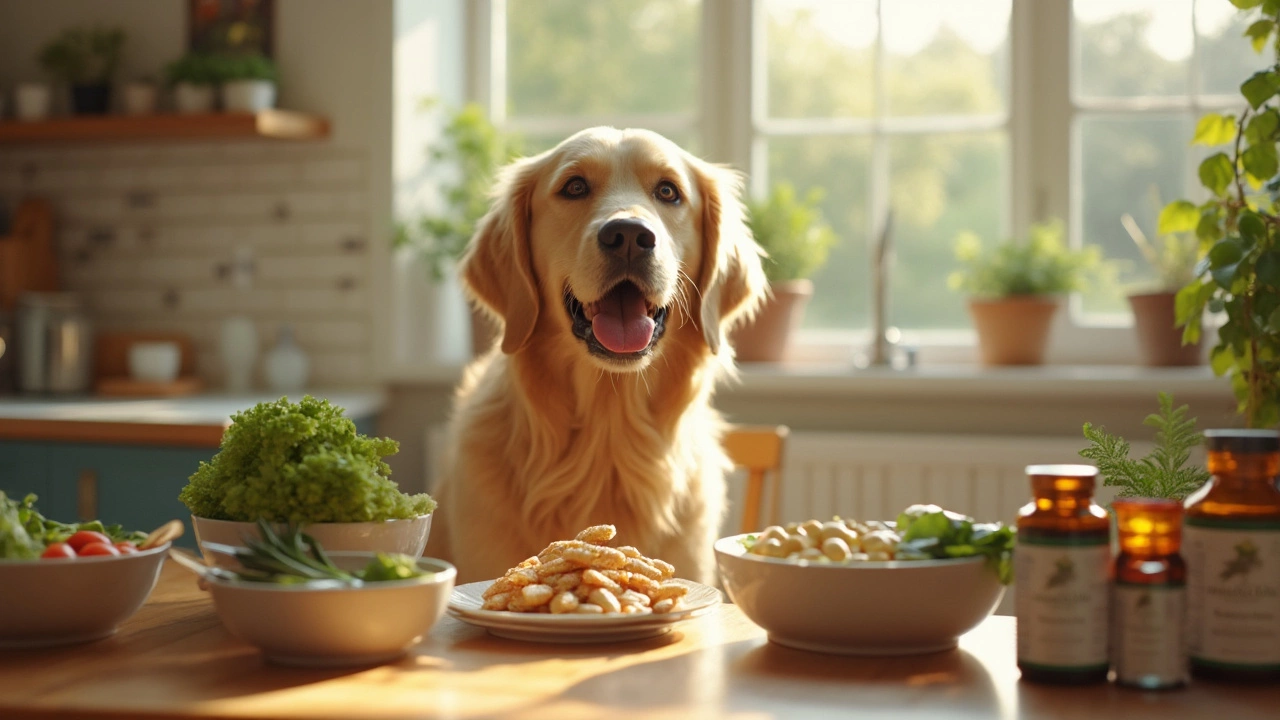Dog Supplements: How to Pick the Best Boost for Your Pup
Feeling confused by the flood of dog supplements on the market? You’re not alone. From joint chews to skin‑boosting oils, the choices can feel endless. The good news is you don’t need a degree in nutrition to find a product that works. Below you’ll get straight‑forward advice on why supplements can help, what to watch out for, and a few reliable options to start with.
Why Use Dog Supplements?
Even a balanced diet can miss key nutrients, especially for active breeds, older dogs, or pups with special needs. Supplements fill those gaps. Common goals include:
- Joint support – glucosamine, chondroitin, and MSM keep hips and knees moving smoothly.
- Skin and coat health – omega‑3 fatty acids from fish oil add shine and reduce itching.
- Immune boost – vitamin C, zinc, or probiotic blends help fend off everyday bugs.
- Digestive aid – enzymes can make meals easier to break down.
When you match a supplement to a specific need, you’ll notice less stiffness, a smoother coat, or a calmer tummy. That’s the practical payoff.
Choosing Safe & Effective Products
Safety should be the first filter. Look for these signs before you click ‘add to cart’:
- Third‑party testing – Independent labs like NSF or Informed‑Choice verify purity.
- Clear ingredient list – No vague “proprietary blend” labels; you want to see exact amounts.
- UK‑approved manufacturing – Products made in the UK or EU follow stricter standards.
- Veterinarian endorsement – If a vet mentions the brand, that’s a strong credibility boost.
Once a product passes those checks, compare dosage instructions with your dog’s weight and activity level. Over‑dosing can be as risky as under‑dosing.
Here are three everyday favourites that meet the safety checklist:
- Joint Chews with Glucosamine – Small, tasty bites that older retrievers rave about. They’re usually 500 mg of glucosamine per 10 kg of body weight.
- Fish‑Oil Softgels – Look for EPA/DHA levels around 300 mg per serving. Dogs love the fishy flavor, and the oils support both joints and skin.
- Probiotic Powder – A spoonful mixed into wet food can improve digestion. Choose strains like Lactobacillus acidophilus, which are proven for canines.
Start with the lowest recommended dose and watch your dog for any changes. If you see stomach upset, reduce the amount or switch to a different brand.
Remember, supplements are not a cure‑all. They work best when paired with a quality diet, regular exercise, and routine vet visits. If your pup has a medical condition, always ask the vet before adding anything new.
Bottom line: pick a product with transparent labeling, third‑party testing, and a vet‑approved formulation. Stick to the right dose, and you’ll see real benefits without unnecessary risk.
Ready to give your dog that extra edge? Check the label, double‑check the source, and start with a small trial. Your dog’s health is worth the extra effort, and the right supplement can make every walk, play session, and cuddle a little better.
- Morgan Ainsworth
- 0 Comments
When to Start Dog Supplements: Age Guide for Healthy Pups
Learn the right age to start dog supplements, from puppies to seniors, with clear guidelines, safety tips, and a practical checklist for pet owners.
View More- Morgan Ainsworth
- 0 Comments
Fish Oil vs Salmon Oil: Which Supplement Is Better for Your Dog?
Comparing fish oil and salmon oil for dogs. Find out which one has more omega-3s, safety tips, and how to choose the best supplement for your pet.
View More- Morgan Ainsworth
- 0 Comments
Do Dog Supplements Really Work? Science, Ingredients, and Tips for Pet Owners
Curious about dog supplements? Get the facts, science, and real talk about dog vitamins, common myths, and tips for choosing the right supplements for your pet.
View More- Morgan Ainsworth
- 0 Comments
Daily Dog Vitamins: What Supplements Does Your Dog Need for Health?
Confused about which vitamins your dog needs every day? Learn which supplements keep your pup healthy, signs of deficiency, and expert-backed tips for daily canine nutrition.
View More- Morgan Ainsworth
- 0 Comments
Why Do Dogs Lick You? Exploring the Reasons and Benefits
Dogs are known for their quirky behaviors, with licking being one of the most common. While it might just seem like a form of affection, licking can actually reveal quite a bit about a dog's physical and emotional health. This article delves into the reasons behind this behavior, including instinctual needs and possible deficiencies. It also discusses how understanding these actions can improve the health and happiness of your pup.
View More- Morgan Ainsworth
- 0 Comments
Benefits of Bone Broth for Dogs: A Guide to Health and Nutrition
Bone broth is rich in nutrients and has been gaining popularity as a supplement for dogs. This article explores the benefits of including bone broth in a dog's diet, such as improved joint health, enhanced digestion, and better hydration. We also discuss how to prepare it safely at home, potential risks, and expert tips for introducing it to your pet. Learn everything you need to know about this healthy addition to your dog's daily regimen.
View More- Morgan Ainsworth
- 0 Comments
Understanding Belly Rub Behavior in Dogs: What It Really Means
Dogs have unique ways of expressing trust and comfort, and allowing a belly rub is one such behavior. Belly rubs can be more than just a request for affection; they can indicate a dog's mood, comfort level, and even health status. Understanding the significance of a dog letting you rub its belly can aid in strengthening your pet-parent bond. Additionally, it can offer insights into how supplements and a well-rounded diet might play a role in this behavior. This article explores the deeper meanings behind belly rub acceptance and its implications on canine well-being.
View More






